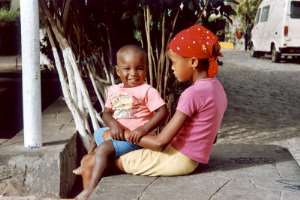
The Ghana adolescent reproductive health program was launched in the Brong Ahafo Regional Capital Sunyani, on Wednesday, 15th October, 2014.
The aim of the program was helping adolescents to access information services and education on reproductive health.
One in five persons worldwide is an adolescent. This translates to a global population of 1.2 billion (2013). Thus nearly half of the people in the world today are younger than 25 years.
This makes the current youth generation the largest in history. In Ghana, the population of adolescents has grown threefold since 1960 from 1,222,295 to 5,427,300 in 2010, accounting for 18.2% and 22.4% of the total population in the same years respectively.
Among females, age at first sexual intercourse is 18.5 years and 20.1 for males. One out of every 10 adolescent is pregnant. 12.3% of female adolescents in Ghana begun childbearing.
Data shows that six out of every 10 adolescents have an unmet need for contraception. 3.6% of adolescents have contracted a Sexually Transmitted Infection (STI). Among adolescents, 1.1% have contracted HIV.
Brong Ahafo Regional Minister, Hon. Eric Opoku in his address said, Adolescence is a period of transition for young people to adulthood. This particular period is characterized by profound biological, cognitive, emotional and social changes that put a lot of pressure on this age bracket. It is important to note that during this period, young people require useful information and education on reproductive health care to cater for their expectations and needs to facilitate their smooth growth and integration into society.
"It is a collective and shared responsibility on the part of all stakeholders to ensure that the right values are transferred to our adolescents to prevent them from becoming deviants in society."
According to Hon. Eric Opoku, 5 Polyclinics have been provided at Techimantia, Wamfie, Bomaa, Kwatire and Nkrankwanta, at a total cost of fourteen million two hundred and sixty five thousand Ghana cedis (GHC 14,265,000.00) which have been equipped with modern state-of-the-art medical equipment, including ultrasound machines, laboratory equipment and beds among other medical equipment to provide quality medical care for the people.
"Also, to improve maternal and child care as well as accelerate the reduction in maternal mortality, a total of 136 CHPS Compounds have been constructed and fully functional across the region." He added.
Mr. Jim MacAlpin, Deputy Head of Office, UKAid said helping children mentally and physically ready and getting them access to information and services they need to make decision transcend borders and remain
global global challenges.
"My country UK is having the highest rate of teenage pregnancies in Western Europe but over the last 40 years managed to significantly reduce it and produce generation of young people with informed about reproductive health."
According to him, Many young people in UK can regularly access information services in schools, clinics and doctor's outfit. And also,reproductive health education has targeted their parents who play attractive roles and engage theirself to make the right choices.
He said the UK Government remains connected to help Ghana achieve it's millennium development goals and promised to help the country tackle it's off-track MDG's head on.
55 million Ghana cedis was committed to help improve reproductive health in the Brong Ahafo region. Deputy Minister of local government, Emmanuel Agyekum cited that the period of adolescent is often associated with some amount of anxiety, difficulty and discomfort not only for the adolescents but their parents, P.A's and communities which may lead to conflict and vulnerability if not well managed.
A statement read on behalf of the Minister of State in charge of Health and Allied Institutions indicated that the program will be coordinated by the Ghana Population Council in partnership with the Ministry of Local Government and will be implemented by Ghana Health Service, Ghana Education Service, Ghana Youth Authority and others.




 Akufo-Addo commissions Phase II of Kaleo solar power plant
Akufo-Addo commissions Phase II of Kaleo solar power plant
 NDC panics over Bawumia’s visit to Pope Francis
NDC panics over Bawumia’s visit to Pope Francis
 EC blasts Mahama over “false” claims on recruitment of Returning Officers
EC blasts Mahama over “false” claims on recruitment of Returning Officers
 Lands Minister gives ultimatum to Future Global Resources to revamp Prestea/Bogo...
Lands Minister gives ultimatum to Future Global Resources to revamp Prestea/Bogo...
 Wa Naa appeals to Akufo-Addo to audit state lands in Wa
Wa Naa appeals to Akufo-Addo to audit state lands in Wa
 Prof Opoku-Agyemang misunderstood Bawumia’s ‘driver mate’ analogy – Miracles Abo...
Prof Opoku-Agyemang misunderstood Bawumia’s ‘driver mate’ analogy – Miracles Abo...
 EU confident Ghana will not sign Anti-LGBTQI Bill
EU confident Ghana will not sign Anti-LGBTQI Bill
 Suspend implementation of Planting for Food and Jobs for 2024 - Stakeholders
Suspend implementation of Planting for Food and Jobs for 2024 - Stakeholders
 Tema West Municipal Assembly gets Ghana's First Female Aircraft Marshaller as ne...
Tema West Municipal Assembly gets Ghana's First Female Aircraft Marshaller as ne...
 Dumsor is affecting us double, release timetable – Disability Federation to ECG
Dumsor is affecting us double, release timetable – Disability Federation to ECG
